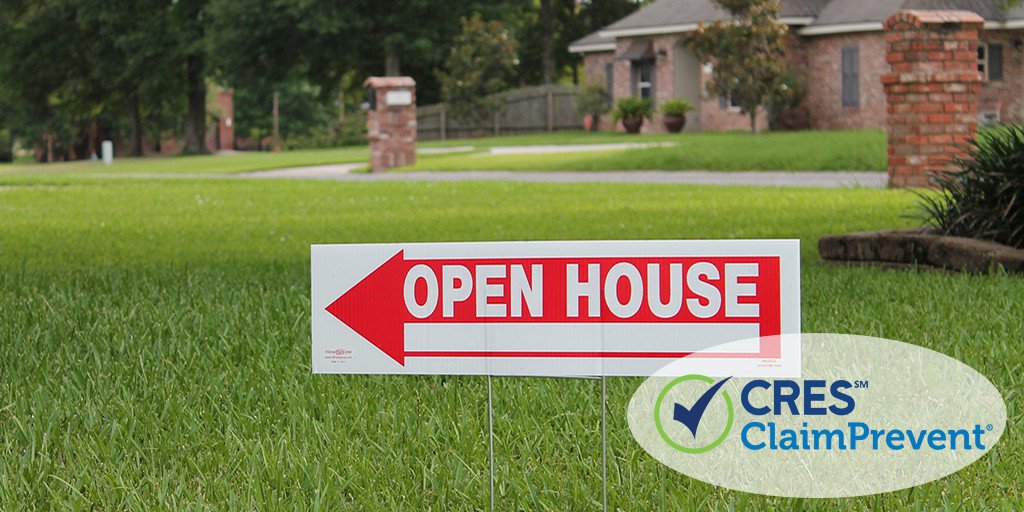As a real estate agent, you already know that open houses are a great way to sell a property. But, what about protecting yourself from issues regarding liability?
Opening up a home to the public brings with it potential risks you need to be aware of — not only to protect yourself, but also the owner of the property and your prospective buyers who come to visit.
Here are some practical tips to mitigate the risks of showing property and conducting an open house.
Provide Sufficient Notice to the Owner
It’s hard to keep a house “inspection-ready” all of the time. Planning an open house well in advance, at a time that suits the owners, increases the likelihood that they will be able to adequately prepare the home ahead of time.
Give your seller tips to ensure that the open house goes smoothly (and safely). Putting away outside items such as shovels and rakes, to ensure people don’t trip over them while viewing the house, will reduce the risk of injury. Any tripping hazards in the home need to be removed. That means putting toys away, moving cords behind furniture, checking floor rugs and removing any unnecessary clutter. It’s also best to avoid mopping the day of the inspection, to avoid someone slipping and falling on a wet floor.
Ideally, it’s better if pets are also not on the property for the open house. This reduces the chance of an unexpected bite or nasty scratch. Sometimes that’s just not feasible, so ask pet owners to have their pets restrained or put away for the duration of the open house.
Plan Ahead if a Property is Vacant
Check ahead of time to make sure the power will be on at the property, if it’s a vacant home. If there’s no power, you may need to choose a time of day where natural light is available to show the home. No lighting, or even poor lighting, can increase risk of tripping, which can mean you and/or the property owner could be facing a lawsuit.
Unfortunately, other things can go wrong in vacant homes if they’re not regularly checked, like undetected leaks or weather damage. Check the home ahead of time to ensure there are no unexpected risks. This is also in your best interest in achieving a sale — because you want to show the property at its best to prospective buyers.
Be Welcoming But Cautious During the Open House
If the home is tenanted, or the owners are living in it, you’ll need to monitor prospective buyers during the open house. This is to prevent theft or damage caused by someone, while the home is open to the public. Sometimes this means you’ll need a second agent or assistant there.
If you open windows and doors for the open house, make sure you lock them all before you leave. Inadvertently leaving something unlocked could lead to a break-in afterward, and this opens you up to an elevated level of risk.
If you find something hazardous during the open house — for example, a broken chair, or a door frame falling off — isolate the hazard. Tape off the area or quickly make a sign of caution, and be sure to advise prospective buyers to watch their step on the way in.
If something does happen — a trip, a fall or a scrape — make sure you have a first aid kit close by. It’s good practice to have one in your vehicle, just in case!
Be Smart About Open Houses and Protect Yourself
Before even considering an open house, confirm the property owner has adequate insurance. If it’s not insured, do not proceed with the open house and tell the property owner it’s too risky to do so.
Keep in mind that, even with insurance, some hazards are too large to proceed with an open house. If you have concerns about the safety of stairs, a falling roof or other dangerous structures, it’s just not worth the risk. While this isn’t likely to be a huge issue for your general suburban open house, it may be an issue for older properties, renovator’s delights and derelict houses that are being sold for demolition.
Most of all, you need to ensure you have adequate insurance. If you’re unsure what your current policy covers, check with your insurer. Because open houses (and showings) are an integral part of being a real estate agent, it pays to insure against the risks associated with these activities.
Most E&O policies do not offer open house and showings coverage, but CRES Insurance does offer that option with CRES Real Estate E&O + ClaimPrevent®. (Depending on your state, it may be included or an optional coverage.) All CRES E&O policies are customized to cover your specific activities and real estate risks. Also called “contingent liability” insurance, our Open House and Showings coverage protects you and your agents, if a prospective buyer gets injured at an open house or showing. It also covers any damage to the property sustained during the open house or showing.
With more than 25 years of expertise in real estate errors and omissions, CRES knows how to protect real estate professionals. Contact us on our toll-free number 800.880.2747 to speak to a CRES real estate E&O professional today.
